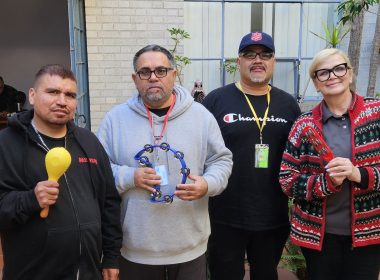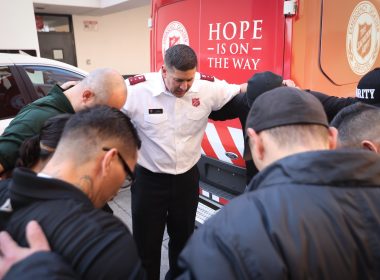By David Kelly, Lt. Colonel –
I wonder if those who observed Jesus most closely would say he was more engaged in doing church or charity. Did he spend more of his three years of ministry teaching people about the Kingdom of God or healing the sick? Did he give himself more fully to discipling people or feeding them? Did he consider one to be “real ministry” and the other not?
I only ask these questions because every so often I hear someone say that they are afraid we are losing our church identity and becoming just a charity, as though somehow we are keeping score between two aspects of our identity that should be totally inseparable.
I think Jesus enjoyed surprising people—perhaps even confounding them. When they came for healing, he gave them stories about the nature of God, and when they came for a sermon and they were hungry, he gave them lunch. In fact, almost everyone who came to Jesus received what they needed and something more.
It’s important to note, however, that Jesus’ teaching about spiritual things was always integrated with the compassionate and practical—and the compassionate and practical was always sprinkled with the truths of the gospel and the grace of genuine forgiveness. Jesus did not have a divided ministry where on some occasions he met strictly spiritual needs and on other occasions he met strictly practical ones; Jesus’ ministry was a fully integrated one.
Far too often we imagine our congregational identity and our social services identity as things we need to keep in balance. We work hard to maintain a careful equilibrium between our emphases on social and spiritual: on service delivery and congregations, and on charity and church. “Balance is key,” we tell ourselves, as though our calling to save souls is somehow distinct from our calling to serve suffering humanity. But there is no model in the Gospels for that kind of segregation within ministry.
Our spiritual ministry and social ministries are not two distinct roles within The Salvation Army; each is integral to the health of the whole.
A friend once explained this unique relationship to me this way: the Army is not made up of a piece of fruit and a scoop of ice cream in a bowl; we are a smoothie, where the spiritual and the social are so blended together that you should never be able to taste one without the other.
Certainly some of us might feel more comfortable as the fruit, and some might be more comfortable as the ice cream, but what the world really needs is a Salvation Smoothie. Those who come to us for practical assistance should receive what they need but that service should always be flavored by grace and unmistakably motivated by God’s love. And those who come to worship should be so filled by the truth of the gospel that they experience a holy craving to serve others.
The Salvation Army is recognized across the world as a church and as a charity but, in our hearts and in our methods, the church and charity should be utterly indivisible. If we are who we are called to be, the world should never taste in us only the church or the charity; we are the best version of ourselves when the whole, delightful flavor of grace permeates everything we do.
From Salvationist UK











